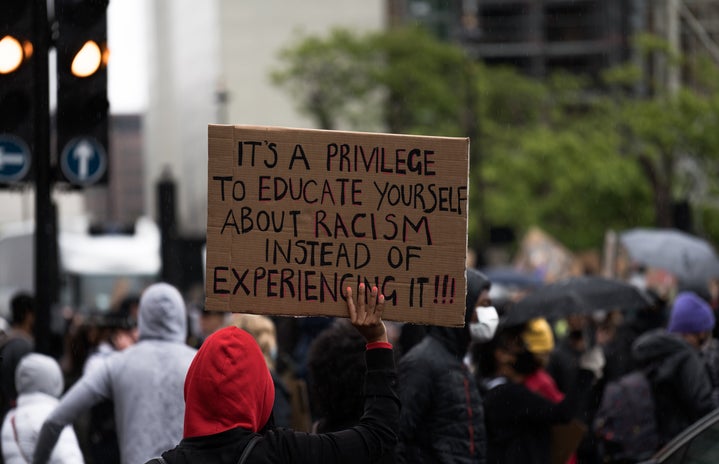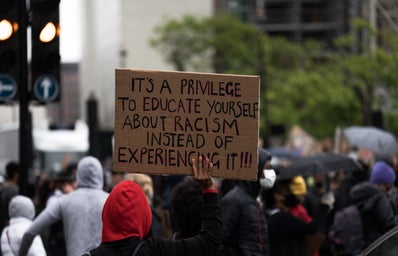On my Instagram feed, I’ve been seeing a lot of Asian American artists and activists spreading messages such as, “If you enjoy our culture, you should speak up.” So, I must ask myself, how do I enjoy AAPI culture?
I try to practice yoga and mindfulness daily. I watch and read animes, manga, and Studio Ghibli films, enjoy Asian cuisines on a weekly basis, drink matcha and bubble tea, as well as listen to Blackpink, and buy artwork from independent, Asian artists. All of these activities, practices, and products enrich my daily life, bring me comfort, and inspire my creativity, and so, it feels wrong to be silent. But, it’s also important to remember that AAPI people’s value doesn’t come from how much we appreciate their culture, but rather based on the simple fact that they’re human beings and deserve respect, equality, and justice.
I don’t identify as an Asian American, but I condemn anti-AAPI, or Asian-American and Pacific Islander, hate, discrimination, and violence. As someone who cares for the AAPI individuals and communities in this country, I’ll strive to do my best to combat this hatred that has skyrocketed during the COVID-19 pandemic. The Stop AAPI Hate non-profit, social organization was founded on March 19, 2020, in response to an increase in xenophobia due to the rise of the pandemic. This reporting center records and responds to incidences of “hate, violence, harassment, discrimination, shunning, and child bullying against Asian Americans and Pacific Islanders in the United States.”
According to the Stop AAPI Hate reporting center,
-
“Between March 19, 2020 (when Stop AAPI Hate began collecting reports) and December 31, 2020, Stop AAPI Hate received over 2,808 firsthand accounts of anti-Asian hate from 47 states and the District of Columbia.”
-
“Between March 19, 2020 and December 31, 2020, Stop AAPI Hate received 126 accounts of anti-Asian hate involving Asian Americans over 60 years old (7.3% of total incidents.”
-
“States with high Asian American populations report the most incidents, with CA (56.4%); NY (7.9%); WA (7.9%); and NV (5.6%) have the highest rates of elderly abuse.”
-
“In the San Francisco Bay Area, 8.2% involved Elderly Asian Americans (35 cases).”
Russell Jeung, Ph.D, one of the co-founders of Stop AAPI Hate, states, “It is up to all of us — businesses, the government, and community partners — to come together and immediately support victims and families affected by these incidents, and work together to create long-lasting solutions that empower our communities with resources, support and education.” We can choose to support our AAPI loved ones by spreading awareness of this violence and by being active allies. Here are six ways you can do so.
1. Do your own research
It is not AAPI people’s jobs nor their responsibilities to educate you. You have to put in the time and effort to research America’s history of anti-Asian violence and discrimination. If you want to learn more about the “model minority” or the racist depictions of Asian Americans in the film, television, and theater industries, it’s up to you to find that information, absorb it, digest it, process it, and try to understand it. If you have questions, that’s great! Get involved in conversations and listen openly to AAPI people’s experiences with grace, respect, and empathy.
2. Be an active ally
It’s one thing to claim allyship for clout or to feign allyship as a means of performative activism, but to be a true ally is to be an active one. So, what does it mean to be an active ally? Kyle Sawyer (he/they), the founder of Building Allies, defines an “active-ally” as “someone who witnesses an injustice and responds to it in any situation.” As Kyle points out, the Active-Ally Model is not a formula to follow, but rather a guide to a process with its three phases of awareness, action, and integration.
Awareness is to first, honestly look inwardly, to evaluate your own biases and acknowledge your privileges, and second, is to look outwardly at society to acknowledge, understand, and try to stand up to systematic racism.
Action is to speak up and act when you see injustices or instances of targeted violence. The action also does not have to be a tangible object such as a petition. It is also listening, educating yourself, and engaging in conversations around bigotry and prejudices.
Finally, integration is mixing it all together, propelling the cycle forward again, or it is “an offer to come to a new Awareness.” In other words, integration allows us to grow and can take the form of challenging ourselves to take action or catching ourselves in a harmful line of thought or behavior.
Just saying you’re an ally doesn’t make you one. It’s essential to follow through on your promise of support and actually support the community or purpose you’re fighting for. This can be done in many different ways, such as showing up, uplifting marginalized voices, and acknowledging and sitting in the uncomfortable situations we must face in order to heal. Don’t make an empty claim of allyship, but instead commit to it. Be aware of the issues, acknowledge your privilege, take action, uplift the voices of the community, and integrate anti-racist beliefs into every aspect of your life. As Sawyer says, active-allyship is a skill that will strengthen with practice.
3. Be actively anti-racist
Not being racist and being anti-racist are two different things. Ibram X. Kendi, an anti-racist activist argues, “The opposite of ‘racist’ isn’t ‘not racist.’ It is anti-racist.” One way to be anti-racist is to condemn racism and spreading awareness of anti-racism.
Another part of being anti-racist is having those difficult, uncomfortable conversations with loved ones. These conversations can be beneficial because you have the chance to explain your beliefs and have an open, honest dialogue with someone you disagree with. You may not be able to change their minds in one conversation, but you may inspire them to look inward and reevaluate their racist beliefs, which can eventually lead to change.
But being anti-racist doesn’t just exist on a personal scale, but also on a societal scale. Kendi advises, “The smart anti-racist identifies racist policy and attacks the racist ideas justifying it.” Being anti-racist is recognizing systemic racism in all of its poisonous forms and challenging the racist ideas which justify these racist structures in our society. Finally, through Kendi’s analysis, we can learn that “everyone, every day, through action or inaction, speech or silence, is choosing in the moment to be racist or anti-racist.”
4. Support local, AAPI businesses and artists
During this pandemic, it’s no secret that small businesses have been suffering, and due to racism, there have been many instances of avoidance and shunning of AAPI owned small businesses, especially restaurants. In fact, of the 2,808 firsthand accounts of anti-Asian hate from the 47 states and the District of Columbia, Stop AAPI Hate found that shunning or avoidance comprised 21.4% of their findings between March and December 2020.
A great way to support small AAPI owned small business is to buy from them, leave positive reviews on their websites and social media accounts, encourage others to buy their products or use their services, and even write letters to the owners to thank them for all their business does for the community. And so, I’d love to give a shout-out to Rai Rai Ramen in Medford, NJ. I crave their curry ramen and chicken katsu curry rice plate every day, even in my dreams, and their boba tea is always a lovely treat. I’ve ordered from them numerous times during this pandemic, and they’ve made quarantine much more bearable with their delicious meals.
Next, I love to support women-owned, independent artists and their businesses on Instagram and Etsy. Over the course of the pandemic, receiving packages from many of the AAPI artists below has seriously helped me get through this pandemic. The care all of these talented artists put into their packaging and products is astonishing. I can’t wait to purchase more goodies in the future!
Amazing Artists:
- @yumisakugawa
- @jisoupy
- @knivesmeow
- @tabetaaii
- @apple.cheeks
- @sadshrimps
- @puuung1
- @madebymalin
- @thanksxu
- @foxville_art
- @anumation
- @hafandhaf
- @pyperbleu
- @instantdoodles
- @courtneyahndesign
- @manjitthapp
I’m so grateful for these creators and I will cherish their art for years to come.
5. Follow AAPI educators to stay educated
It’s important to stay informed and spread resources compiled and created by AAPI activists too. Annie Wu and Kim Saira have created amazing, informative slides including, “Being Anti-Racist Includes Acknowledging the Asian American Experience,” “How to Be an Ally & Help Asian Americans Fight Anti-Asian Racism,” and “Resources to Help Asian Americans in NYC.” I highly recommend reading these resources and sharing the included information online and offline.
Additional activists I follow, who are all amazing:
- @intersectional.abc
- @corpusren
- @asian.actiivist
- @amandangocnguyen
- @angryasianfeminist
- @michellekimkim
It’s so important to listen to the experiences of AAPI Americans and uplift their voices.
6. Check in on your AAPI loved ones
With everything going on now, it is important to check in with your AAPI friends and family. Even if you can’t physically be there with your loved ones, you can still support them remotely by calling or texting them, face-timing them, writing them letters, or sending them care packages. Mental health is just as important as physical safety, so I implore you to make it a priority to check in on your loved ones who may be struggling to cope with this rise in anti-Asian violence.
One of my favorite quotes by acclaimed author, Chimamanda Ngozi Adichie, is “The old silence had broken and left us with the sharp pieces.” We’re now dealing with the broken, sharp pieces of the shattered silence on racism. We must band together in order to affect long-lasting, positive change for future generations.
I would love to listen to and amplify your experiences with being targeted by or witnessing AAPI Anti-Asian hate and violence. If you would like to continue this discourse, please feel free to message me on Instagram @bunana.breads. Stay safe, lovelies!
Additional Resources:
Report an incident of violence or hate


